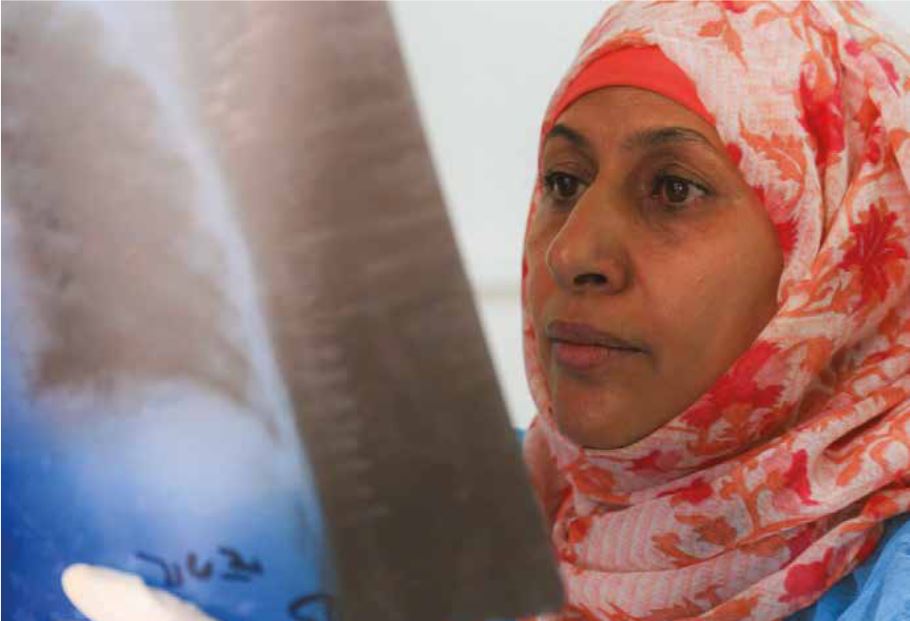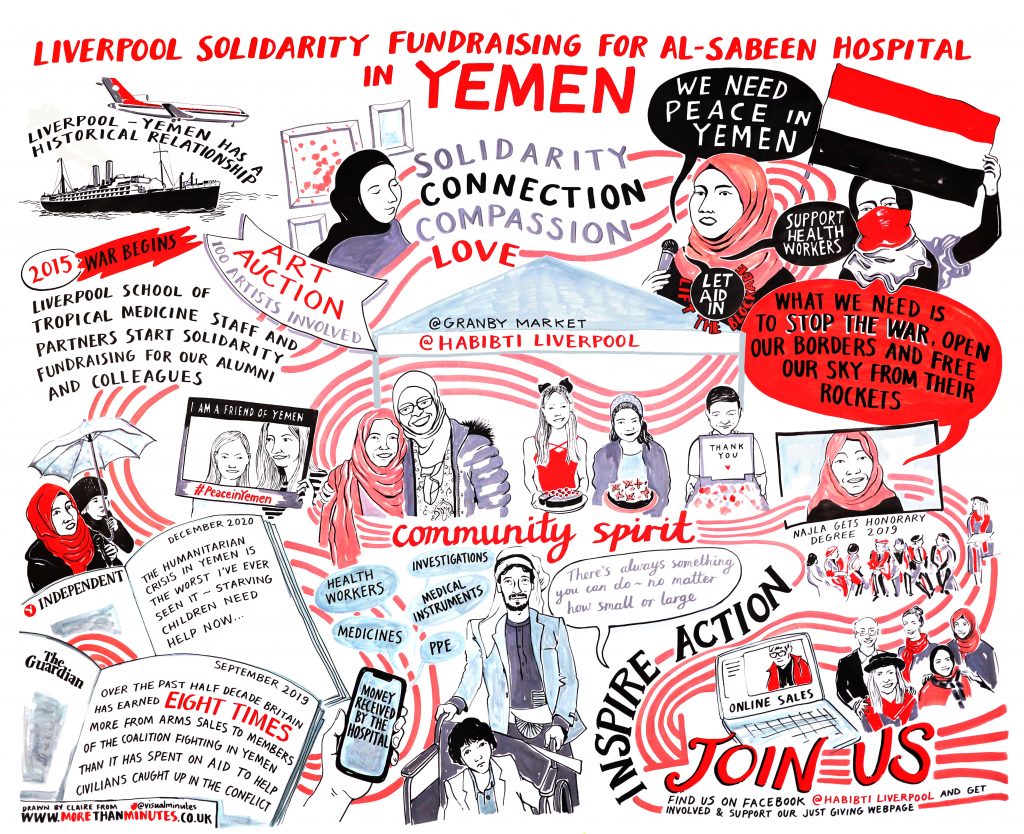
Image: UNICEF
Health workers on the frontline
5 April 2022
On World Health Worker Week [opens new tab] we are thinking about the amazing people who are doing very difficult jobs in challenging conditions. Several of our studies have and will continue to work in collaboration with health workers operating in contexts of shocks and fragility, trying to find ways to support them and make the health systems in which they operate more resilient. One of those people, and a recognised Heroine of Health [opens new tab], is Professor Najla Al-Sonboli, a paediatrician from Al-Sabeen Hospital for Maternity and Children in Sana’a, Yemen. In this article (which is based on a piece originally published in the 2019 Liverpool School of Tropical Medicine Graduation Magazine [opens new tab]) Professor Al-Sonboli talks about her role, treating children in a war zone and the challenges she faces. Since then, challenges have intensified, with ongoing war, exacerbated severe and acute malnutrition and COVID-19.
How can one focus and work without a salary? Or when bombs are exploding nearby? Or when you worry that your staff won’t make it home? Or that an epidemic or pandemic could compromise your hospital?
For the past seven and a half years, Professor Najla Al-Sonboli has dedicated her life to helping some of the most vulnerable victims of war-torn Yemen, the children. Every day she sees innocent children come through the doors of her hospital, victims of a war that has ravaged her home country. “I see children suffering and dying right in front of my eyes, I needed to do something to help.”
Professor Al-Sonboli studied at Liverpool School of Tropical Medicine (LSTM), completing a Master’s in Tropical Paediatrics, a Diploma in Tropical Child Health and a PhD in paediatric health. Now a leading paediatrician and researcher (often working with LSTM), Professor Al-Sonboli is head of the Paediatric Department at Al-Sabeen Hospital for Maternity and Children in Sana’a.
“I love kids, I can’t bear the thought that anything could hurt them. So, I decided to study paediatrics and help children in Yemen. Because of war, they are dying from diseases, hunger and crossfire. They are suffering too much; many have lost their parents, and many are displaced and separated from their families and their homeland.”
In the face of war and grave personal risk, Professor Al-Sonboli and her team work tirelessly, providing essential and much-needed medical care to thousands of children, while organising staff to provide voluntary services with minimal resources, and coping with the new problems her paediatric department faces.
“Every day brings new challenges. We are facing the spread of many epidemics and diseases such as measles, cholera and severe malnutrition… We are admitting cases even on the floor, on chairs, inside their cars with IV stands to prevent them from getting shocked. It is a real disaster… At times we have had to work under fire. Parts of our hospital have been destroyed, and once, one of the rockets hit inside the hospital. This meant our medical staff couldn’t come to work.”
After years of brutal conflict, many of the doctors and nurses are tired. For years, staff have received no salary, many being left without enough money to feed their families. “Some of my colleagues are struggling to buy food for their own children. When this happens, we all come together and make sure we can support them by collecting small amounts of money to help them”
Supporting healthworkers
For some time habibti Liverpool (a Liverpool solidarity fundraising community group – see their Facebook page), staff at LSTM and the wider community have been raising vital funds to support colleagues in Yemen to provide essential medical care to save children’s lives in an incredibly difficult situation. This solidarity fundraising has supported voluntary nurses and doctors, extended the Paediatric Intensive Care Unit and emergency services for children, bought equipment and developed a new cardiopulmonary resuscitation point.

Najla said: “The toughest challenges that I faced are to work without salary. If it wasn’t for the generosity of LSTM alumni, staff and the Liverpool community, we don’t know what we would do”
When asked for the best advice she has ever received, she said: “To be a good leader, you have to lead by example – you have to become a symbol”. Professor Al-Sonboli is an example of true leadership. Her work and determination have inspired her hospital staff to persevere and simultaneously inspired the international community to recognise her achievements.
“For me, I had the chance to fly out of Yemen as many did but I preferred to stay and help my people. I thought: “If I run away and I am the head of the department, then who will stay? No one will come to work.” So, I decided to go to my hospital under fire and to try to encourage my colleagues to come, too.”
In 2018, Professor Al-Sonboli was a recognised Heroine for Health at the World Health Assembly meeting in Geneva. The awards celebrated the contributions of nine Heroines for Health, recognising their leadership and impact in their communities. Unable to leave Yemen, Professor Sally Theobald of ReBUILD for Resilience accepted the award on her behalf saying:
“Sadly, war and fragility are not going away. We need to recognise, honour and learn from Najla and all the heroes and heroines that work alongside her, in continuing their efforts to bring hope and save lives. This award reflects the respect and support from the global health community for all that they do.”
Further information
- More on the research we are undertaking with Professor Al-Sonboli – Mapping the resilience capacities and coping mechanisms of health workers and other cadres in hospital emergency departments in Sana’a during protracted conflict and crisis in Yemen – can be found here.
- Listen to a BBC Radio interview with Professor Al-Sonboli here. [opens new tab]
- Article: ‘LSTM alumna and research partner recognised as a Heroine for Health at WHO’ [opens new tab]
- Blog post: ‘Liverpool – Sana’a: Solidarity, connection and community engagement‘ [opens new tab]
Lead image: Najla Al-Sonboli, courtesy of UNICEF
Second image: The Liverpool – Yemen solidarity connection and engagement by Claire Stringer from Visual Minutes, shown at the online Liverpool-Yemen Vigil in December 2020